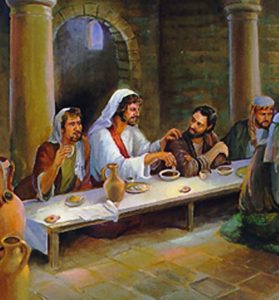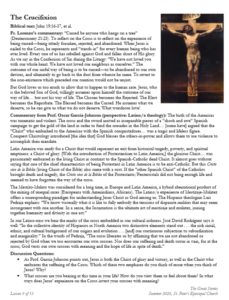
Biblical text: Mt. 26:17-30, Mk. 14:12-26, Lk. 22:7-39, Jn. 13:1-17:26
Fr. Lorenzo’s commentary: There is something radically personal about the Eucharist. The words Jesus says to his disciples in the Last Supper, and the words addressed to us every time we celebrate Communion, are not vague generalities about Jesus’ love for humankind, but second-person addresses. “This is my body, given for you.” “This is my blood, shed for you.” It is sometimes hard for me to get my head around this personal encounter with Jesus. I can understand the concept that Jesus listens to the prayers of humanity, but that he is listening as I say my prayers to him, right this moment? I can understand that Jesus gives his body and blood in the Eucharist, but that he gives them to me specifically, with me in mind?
It would probably be easier, from a spiritual standpoint, to take the “encounter with Christ” and shift it up to the universal level. One could then take refuge in generalities without having to grapple with Christ personally. Because the encounter with Christ can be exhausting—like Jacob wrestling the angel. Christ never ceases to call out our sins. He never ceases to encourage us to deny ourselves and take up our crosses. I see why the Psalmist says, “Turn your gaze from me, that I may find comfort again before I depart and am no more.” To put that sentiment in my own words, “Wow, you’re a lot, can you please not pay attention to me every moment of every day?” To be in personal encounter with God can be daunting. Yet God does call out to us every moment, desiring to have communion with us. And this communion is radically personal—it is “for you,” not just “for human beings generally.” Growing more comfortable with this personal encounter, in all its discomfort and consolations, all its joys and struggles, is at the heart of the Christian life. And so the Eucharist, which announces, offers, and sustains that personal encounter, is at the heart of the Christian life as well.
Commentary from the Rev. D.T. Lancaster (perspective: Messianic Jewish theology): Judaism teaches that, at the Messianic banquet in the kingdom, the Messiah will receive his coronation rites, take four cups in his hands, and pronounce the blessings over wine preserved since the foundation of the world. The twelve disciples came to Jerusalem expecting just such a festive meal. They anticipated a violent upheaval, throwing off the Roman yoke, followed by the coronation of the king. They had expected a resurrection of the dead and a great banquet with the Messiah. Instead, they had a simple Seder with the Master, a foretaste of the appointed time to come.
During the course of the Seder meal, the master of the table lifts the unleavened bread and declares, “This is the bread of affliction.” Later, he says the blessing for bread, breaks it, and distributes it to everyone at the table. Jesus made the blessing for bread: “Blessed are you, LORD our God, King of the Universe, who brings forth bread from the earth.” Then he broke the bread of affliction, ate some, and distributed it among his disciples, telling them, “Take, eat; this is my body which is given for you; do this in remembrance of me.” With those words, he invested the Passover ritual with new, additional significance. Previously, the disciples of Jesus ate the unleavened bread at Passover in remembrance of the Exodus from Egypt. By declaring the unleavened bread as a symbol for his body, the Master invited the disciples to henceforth remember Passover as the occasion of his suffering and sacrifice.
Discussion Questions:
- What has your personal encounter with Jesus been like lately? Do you feel close to him? Far from him? How can you be more open to his presence in the week to come?
- Every time we celebrate the Lord’s Supper, we remember Jesus’ death on the Cross for us. How can we remember Jesus throughout the day and throughout the week?
- “Bitterness” and “affliction” are two terms used in the Passover meal to describe Israel’s experience of slavery in Egypt. What is afflicting you right now? What would it look like for you to entrust these afflictions to God?



Comments are closed.